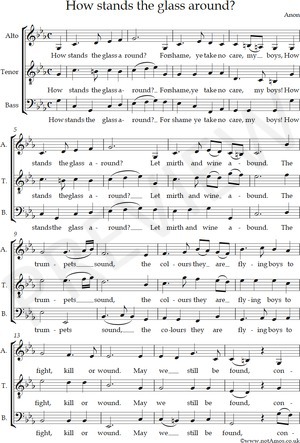 notAmos Performing Editions 1 Lansdown Place East, Bath BA1 5ET, UK +44 (0) 1225 316145 Performing editions of pre‑classical music with full preview/playback and instant download |
Anon
(c.1729)
How stands the glass around?
(A.T.B.)
Full score (PDF), €0.00 for unlimited copies Download this item(c.1729)
How stands the glass around?
(A.T.B.)
Printable cover page (PDF), €0.00 for unlimited copies Download this item
If you have any problem obtaining a PDF, please see our help page. If that does not resolve the issue, please click here.

This work, Anon : How stands the glass around? : scoreid 115360, as published by notAmos Performing Editions, is licensed under a Creative Commons Attribution-ShareAlike 4.0 International License. All relevant attributions should state its URL as https://www.notamos.co.uk/detail.php?scoreid=115360. Permissions beyond the scope of this licence may be available at https://www.notamos.co.uk/index.php?sheet=about.
A favourite song of General Wolfe, allegedly sung by him at Quebec the night before his death. But the legend relies on an inexact reading of the description in Krifft's "Siege of Quebec, a sonata" (c. 1797): "A favorite song of General Wolfe's & sung the evening before the engagement wherein he was killed". The present harmonization is that of Krifft, who completed "The siege of Quebec" after the majority had been composed by Kotzwara, before his untimely demise from erotic asphyxiation (Kotzwara's "Battle of Prague" was a favourite of Jane Austen). The song appears first in a ballad opera of 1729 called "The Patron" (I have not seen this source) and bears more than a passing resemblance to an Act Tune by Jeremiah Clarke associated with the play "A Wife for any man", 1696.
Lyrics: Anon
How stands the glass around?
For shame, ye take no care my boys,
How stands the glass around?
Let mirth and wine abound.
The trumpets sound;
The colours they are flying boys
To fight, kill or wound.
May we still be found,
Content with our hard fare my boys
On the cold, cold ground.
Why, soldiers, why,
Should we be melancholy, boys?
Why, soldiers, why?
Whose business 'tis to die!
What, sighing? Fie!
Damn fear, drink on, be jolly, boys,
'Tis he, you or I.
Cold, hot, wet or dry,
We're always bound to follow, boys,
And scorn to fly.
'Tis but in vain,
(I mean not to upbraid you, boys),
'Tis but in vain For soldiers to complain.
Should next campaign
Send us to Him who made us, boys,
We're free from pain.
But should we remain,
A bottle and kind landlady
Cures all again.
How stands the glass around?
For shame, ye take no care my boys,
How stands the glass around?
Let mirth and wine abound.
The trumpets sound;
The colours they are flying boys
To fight, kill or wound.
May we still be found,
Content with our hard fare my boys
On the cold, cold ground.
Why, soldiers, why,
Should we be melancholy, boys?
Why, soldiers, why?
Whose business 'tis to die!
What, sighing? Fie!
Damn fear, drink on, be jolly, boys,
'Tis he, you or I.
Cold, hot, wet or dry,
We're always bound to follow, boys,
And scorn to fly.
'Tis but in vain,
(I mean not to upbraid you, boys),
'Tis but in vain For soldiers to complain.
Should next campaign
Send us to Him who made us, boys,
We're free from pain.
But should we remain,
A bottle and kind landlady
Cures all again.
